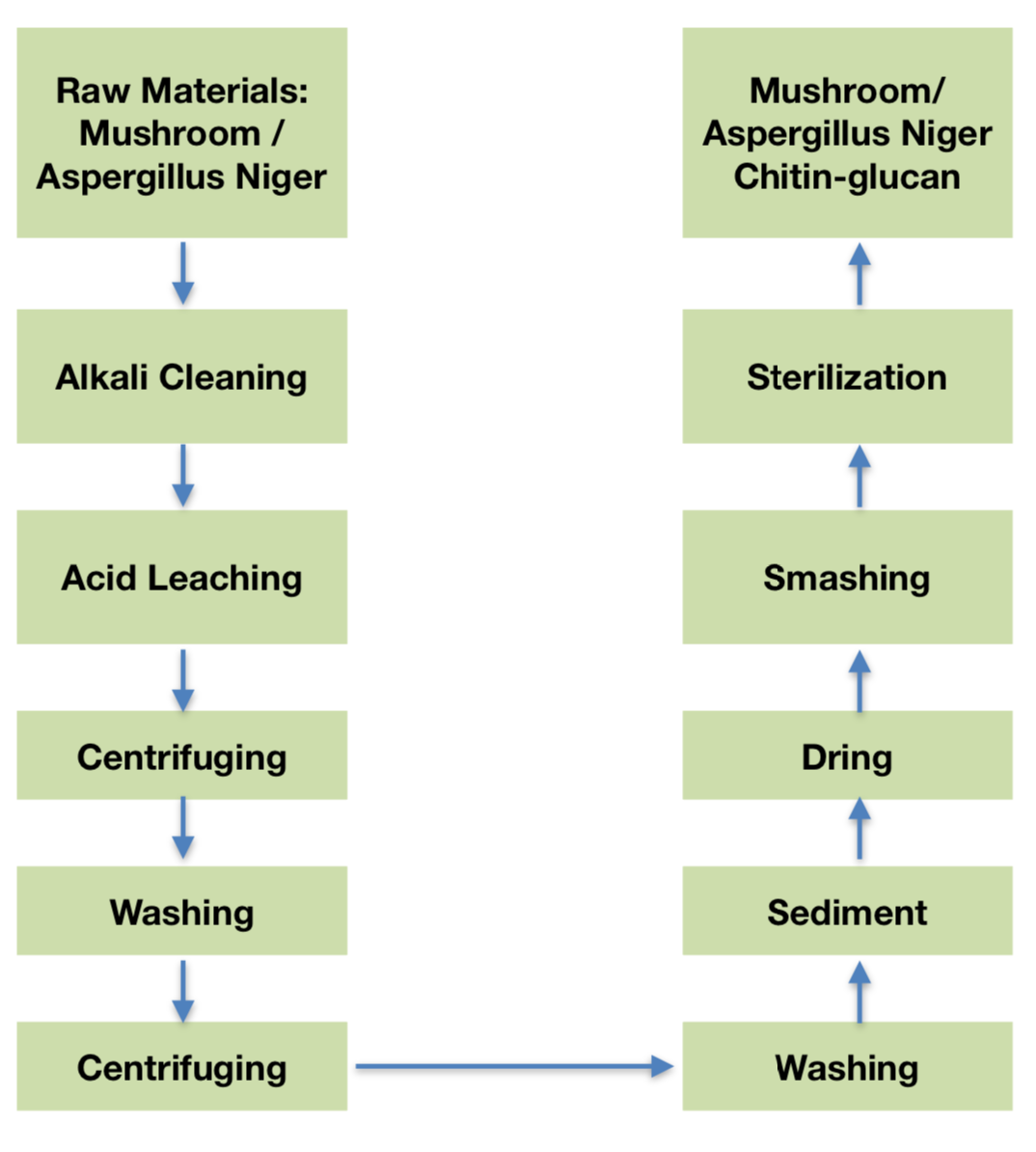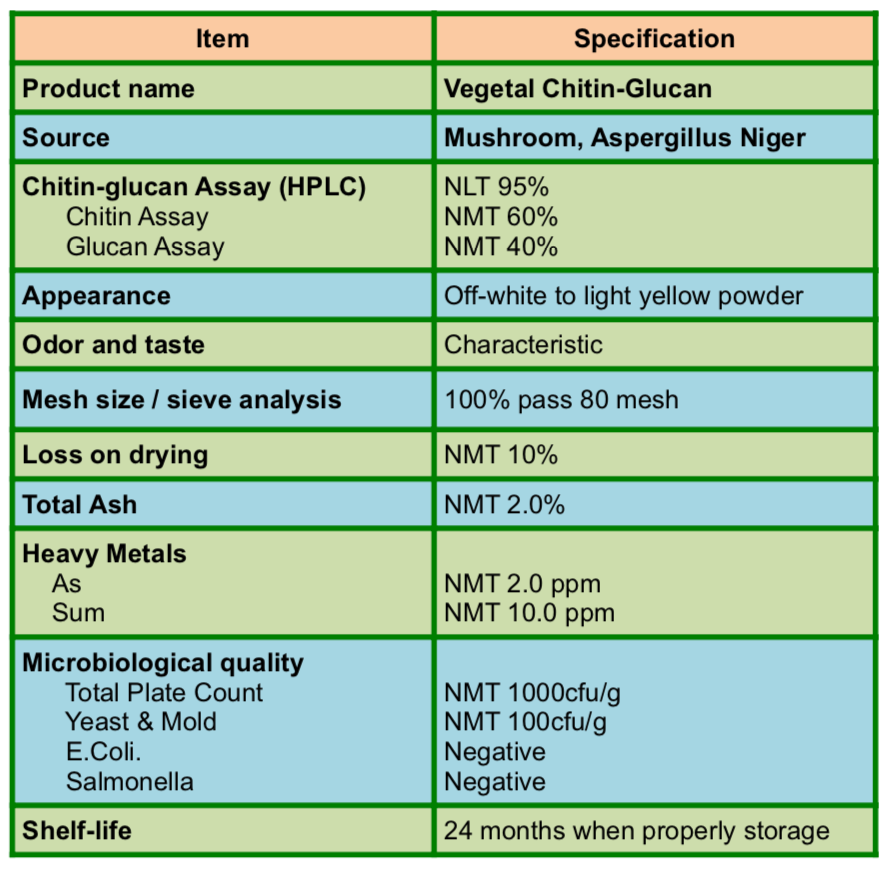Vegetal Vegan Fungal Mushroom Aspergillus Niger Chitin-glucan
A Revolutionary 100% Plant-based Ingredient in Various Industries:
Food, Wine, Cosmetics, Pharmaceuticals, Agriculture and Water Treatment, etc.
Vegetal Chitin-glucan
Vegetal chitin-glucan is a natural polysaccharide complex derived from the cell walls of fungi, such as mushrooms and Aspergillus niger.
It offers antimicrobial, antioxidant, and prebiotic properties, making it valuable in various industries including food, wine, cosmetics, pharmaceuticals, agriculture, and water treatment.

Mushroom Chitin-glucan
Source: Mushroom (oyster mushroom & agaricus bisporus)
Content of chitin & glucan: NLT 95%

Aspergillus Niger Chitin-glucan
Source: Aspergillus Niger
Content of chitin & glucan: NLT 95%
Advantages & Benefits of Vegetal Chitin-glucan
GMO-free
Allergen-free
Gluten-free
Toxicity-free
Curelty-free
Irradiation-free
Biodegradable
Biocompatible
Renewable
Food Grade
Antimicrobial & Antibacterial
Antioxidant
Prebiotic
Vegan
100% Plant-based
Environmental Friendly
Knowledge of Vegetal Chitin-glucan


1. What is Vegetal Chitin-glucan
Vegetal Chitin-glucan is of fungus origin and is a natural polymer, the main component of the cellular walls of Aspergillus niger & Mushrooms. It is initially extracted and purified from the mycelium of Aspergillus niger & Mushrooms. This fungal resource is a by-product of the citric acid produced for the food and pharmaceutical markets.
Vegetal Chitin-glucan is composed of polysaccharides chitin (repeat units N- acetyl-D-glucosamine) and 1,3-ß-glucan (repeat unit D-glucose). The two polymers are covalently connected and form a three-dimensional network. The chitin/glucan ratio ranges from 25:75 to 60:40 (m/m).
2. What is main functions of Vegetal Chitin-glucan?
- Antimicrobial Properties: Chitin-glucan exhibits strong antimicrobial activity, making it useful in food preservation and medical applications.
- Biodegradability & Biocompatibility: It is biodegradable and can be broken down by natural biological processes. It is also biocompatible, which means it is suitable for use in medical and pharmaceutical applications without causing adverse reactions.
- Prebiotic Effects: Chitin-glucan acts as a prebiotic, promoting the growth of beneficial gut bacteria and improving digestive health.
- Immune System Support: It has been shown to modulate the immune system, enhancing the body’s defense mechanisms.
- Wound Healing: Its ability to promote cell proliferation and collagen synthesis aids in wound healing and tissue regeneration.
- Antioxidant Properties: It has antioxidant properties, which help in protecting cells from damage caused by free radicals.

3. What are the main applications of vegetal chitin-glucan?
Vegetal chitin-glucan is a game-changing ingredient with diverse applications across multiple industries.
Its natural origin, multifunctional properties, and effectiveness in improving product quality and stability make it an invaluable asset in food, winemaking, cosmetics, pharmaceuticals, agriculture, environmental management (water treatment).
By leveraging the unique benefits of vegetal chitin-glucan, industries can innovate and enhance their products while adhering to sustainable and natural production practices.







Food Industry
- Food Preservation: Vegetal chitin-glucan has been approved as a natural preservative due to its antimicrobial properties. It helps extend the shelf life of food products by inhibiting the growth of spoilage microorganisms and pathogens.
- Dietary Supplements: Approved for use in dietary supplements, chitin-glucan acts as a prebiotic, promoting gut health and enhancing the growth of beneficial intestinal bacteria. It has shown effectiveness in improving digestive health and boosting the immune system.
Wine Industry
Vegetal chitin-glucan can be used as a fining agent of musts during racking in order to reduce the colloid content and cloudiness.
It is also used for stabilising wines prior to bottling after alcoholic fermentation. This polymer has a stabilising capacity with respect to ferric breakages. It also helps eliminate undesirable compounds such as heavy metals (lead, cadmium), mycotoxins, etc.- Clarification and Fining: Improves wine clarity by binding to suspended particles, resulting in a clearer product.
- Microbial Control: Inhibits spoilage microorganisms, enhancing the microbiological stability of wine.
- Tannin and Polyphenol Management: Reduces astringency and bitterness, stabilizes color, and improves mouthfeel.
- Oxidation Prevention: Protects wine from oxidative damage, preserving flavor, aroma, and color.
- Enhanced Filtration: Improves filtration efficiency, preventing filter clogging and extending filter life.

Cosmetics & Personal Care
- Skincare Products: Vegetal chitin-glucan is used in various skincare products such as creams, lotions, and serums. Its effectiveness in providing moisture, improving skin elasticity, and reducing inflammation has been well-documented. It also helps protect the skin from environmental stressors due to its antioxidant properties.
- Hair Care: In hair care formulations, chitin-glucan enhances hair strength, protects against damage, and improves overall hair health, making it a popular ingredient in shampoos and conditioners.
Medical & Pharmaceuticals
- Wound Care: Approved for use in wound dressings and healing products, vegetal chitin-glucan promotes faster wound healing by stimulating collagen production and cell proliferation. Its biocompatibility and antimicrobial properties make it effective for treating wounds and preventing infections.
- Drug Delivery: Vegetal chitin-glucan is used as a carrier in drug delivery systems due to its ability to encapsulate and protect active pharmaceutical ingredients, enhancing their stability and bioavailability.


Agriculture
- Biopesticides: Vegetal chitin-glucan is approved for use as a natural biopesticide. It helps protect plants from fungal infections and pests, promoting healthier crop growth without the need for synthetic chemicals.
- Soil Conditioner: Used as a soil conditioner, chitin-glucan improves soil health by enhancing nutrient availability and promoting the growth of beneficial soil microorganisms.
Environmental Management
Water Treatment: Approved for use in water treatment processes, vegetal chitin-glucan is effective in removing heavy metals and other contaminants from wastewater, contributing to cleaner and safer water.

4. What is production flowchart and specification of vegetal chitin-glucan?

Production Flowchart of Vegetal Chitin-glucan

Specification of Vegetal Chitin-glucan
5. How About the Solubility of Vegetal Chitin-glucan?
Vegetal Chitin-glucan, a complex polysaccharide consisting of chitin and glucan, generally exhibits limited solubility in water and organic solvents due to its high molecular weight and strong intermolecular hydrogen bonding.
However, certain conditions and solvents can enhance its solubility or enable its dispersion in liquid form.
Acidic Solutions
Dilute Acids: Chitin-glucan can be partially soluble in dilute acidic solutions, such as acetic acid or hydrochloric acid, due to the protonation of amino groups in the chitin component. However, the glucan part may not fully dissolve, leading to a suspension or dispersion rather than a true solution.
Organic Acids: Some organic acids, like lactic acid or citric acid, may also improve the solubility of chitin-glucan by breaking down intermolecular hydrogen bonds.
Organic Solvents
Dimethyl Sulfoxide (DMSO): DMSO can solubilize chitin-glucan to some extent, particularly when combined with other solvents or reagents that disrupt hydrogen bonds.
Ionic Liquids: Certain ionic liquids have shown promise in dissolving chitin and chitin-glucan complexes due to their ability to disrupt strong hydrogen bonding networks.
Alkaline Solutions
Strong Alkaline Solutions: Sodium hydroxide (NaOH) solutions can help solubilize chitin-glucan by deacetylating the chitin component, forming a more soluble chitosan-glucan complex. However, this may alter the structure and properties of the original chitin-glucan complex.
Water with Additives
Water with Surfactants: Adding surfactants or dispersing agents can help disperse chitin-glucan in water, creating stable colloidal suspensions or emulsions.
Enzymatic Treatment
Enzymes: Specific enzymes, such as chitinases or glucanases, can partially degrade chitin-glucan, improving its solubility or dispersibility in aqueous solutions.
Practical Considerations
- Temperature: Increasing the temperature can enhance the solubility of chitin-glucan in certain solvents, although care must be taken to avoid thermal degradation.
- pH: Adjusting the pH can influence the solubility of chitin-glucan, with acidic or alkaline conditions often being more favorable than neutral pH.
- Mechanical Agitation: Using ultrasonic treatment or high-shear mixing can help disperse chitin-glucan in liquids, even if complete solubility is not achieved.
Vegetal Chitin-glucan is generally not highly soluble in water or organic solvents. However, its solubility can be improved in acidic or alkaline solutions, certain organic solvents like DMSO, and water with additives such as surfactants. Enzymatic treatment and mechanical agitation can also aid in dispersing chitin-glucan in liquids.
6. What is difference between Vegetal Chitin-glucan & Vegetal Chitosan?

Get in Touch with Us

- Get Free Sample
- Get Step Quote
- 24/7 Service
- Customized Specification
- Confidentiality Agreement

